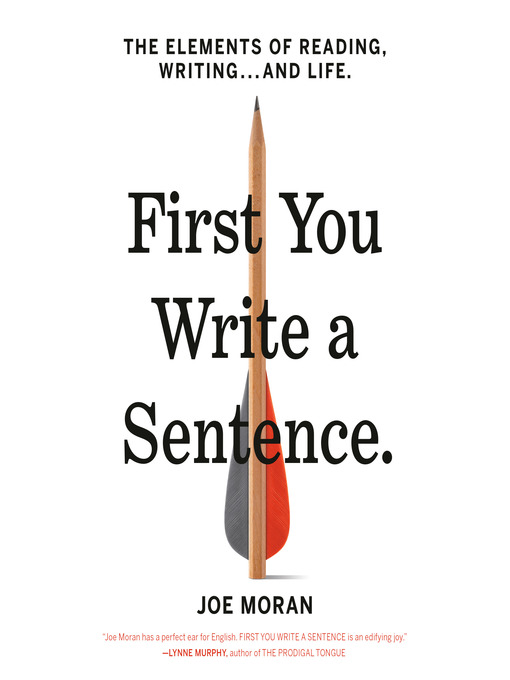- Careers
- Study Aids & Workbooks
- Language Arts & Writing
- Personal Finance
- Student Success
- See all student resources collections
First You Write a Sentence
The Elements of Reading, Writing . . . and Life
An exploration of how the most ordinary words can be turned into verbal constellations of extraordinary grace through the art of building sentences
The sentence is the common ground where every writer walks. A good sentence can be written (and read) by anyone if we simply give it the gift of our time, and it is as close as most of us will get to making something truly beautiful. Using minimal technical terms and sources ranging from the Bible and Shakespeare to George Orwell and Maggie Nelson, as well as scientific studies of what can best fire the reader's mind, author Joe Moran shows how we can all write in a way that is clear, compelling and alive.
Whether dealing with finding the ideal word, building a sentence, or constructing a paragraph, First You Write a Sentence informs by light example: much richer than a style guide, it can be read not only for instruction but for pleasure and delight. And along the way, it shows how good writing can help us notice the world, make ourselves known to others, and live more meaningful lives. It's an elegant gem in praise of the English sentence.
-
Creators
-
Publisher
-
Release date
August 13, 2019 -
Formats
-
OverDrive Listen audiobook
- ISBN: 9780593150191
- File size: 230145 KB
- Duration: 07:59:28
-
-
Languages
- English
-
Reviews
-
AudioFile Magazine
Author and professor Joe Moran affectionately explains the importance of the sentence, and offers insightful writing tips. Narrator John Lee's sophisticated and scholarly tone adds character to Moran's poetic emphasis on words and their beauty. Both unequivocally convince listeners of the value and allure of the well-crafted sentence, using examples from renowned writers. Lee's distinguished delivery is strong during the author's instructions for being a writer. This listen offers hope to anyone pursuing an artistic, loving approach to the written word and authorship. With appreciation for word choice and sentence structure, Moran assures listeners that anyone can write a good sentence. D.Z. © AudioFile 2019, Portland, Maine -
Publisher's Weekly
May 27, 2019
Less style guide than extended meditation on the sentence as written communication’s basic building block, this is a heartfelt but sometimes overwrought affair. Moran, an English and Cultural History professor at Liverpool John Moores University, emphasizes that form is just as important as content. He provides many pieces of useful advice: the passive voice can be used effectively if done carefully; avoid using adjectives unnecessarily (as “hollow intensifiers”) and instead use them to “make a noun more specific”; and don’t discount writing as easy—it is work. He makes persuasive arguments for the virtues of succinct, plain writing and for a more ornate style without definitively favoring either—the key is to be adept at whichever is chosen. His own florid style, however, often gets in the way, and he falters when not directly addressing style points. An appendix of “20 Sentences on Sentences” seems more like a fortune cookie compendium than sound advice on composition. (“Train your ears, for how a sentence sounds in the head is also what it says to the heart.”) Anyone who has waxed poetic about good writing will enjoy parts of Moran’s book, but tolerance for the complete package will depend on the individual reader.
-
Formats
- OverDrive Listen audiobook
Languages
- English
Loading
Why is availability limited?
×Availability can change throughout the month based on the library's budget. You can still place a hold on the title, and your hold will be automatically filled as soon as the title is available again.
The Kindle Book format for this title is not supported on:
×Read-along ebook
×The OverDrive Read format of this ebook has professional narration that plays while you read in your browser. Learn more here.


